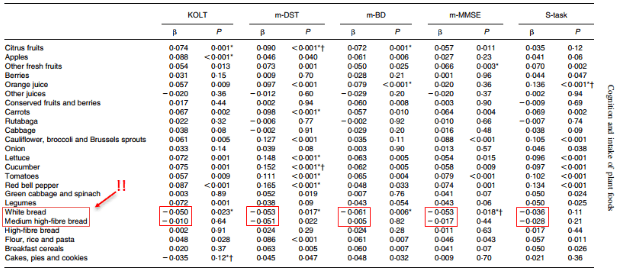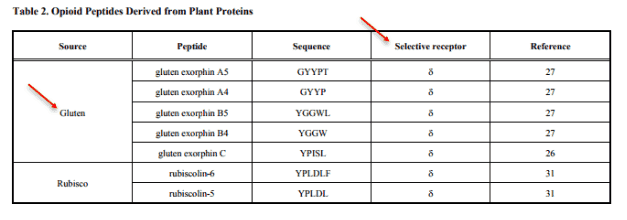
[cmamad id=”13055″ align=”center” tabid=”display-desktop” mobid=”display-desktop” stg=””]
Should you go gluten-free? Is it worth the bother?
—–Important Message—-
Harvard University admits it: “We were wrong – aging is partially reversible.”
Some of us could live to be 150 years old.
This Harvard discovery has literally rolled back the clock on men’s bodies and brains.
 These men at the age of 80 are in virtually the same condition as 50-year-olds or even younger men.
These men at the age of 80 are in virtually the same condition as 50-year-olds or even younger men.
The secret is in the energy-producing mitochondria where free radicals are generated.
Glycine helps. So does this discovery from Harvard.
Imagine reclaiming the sexual prowess you had as a young man.
Some men report almost embarrassingly hard erections that appear out of nowhere. Morning hard-ons and youthful energy are part of their daily life again.
Here’s what will get you your youthful energy and virility back, according to Harvard.
—————
Should you really avoid gluten?
By now we all know there are foods that can be harmful to our health.
For instance, eating certain foods can predictably cause diabetes, obesity, cardiovascular disease, and cancer.
But few people pay attention to how food can affect the brain.
This is important, as the ability to think clearly and quickly can allow us to deal better with so many things.
While some obvious chemicals should only be used in moderation, it’s the same with certain foods.
And one of those is bread.
[cmamad id=”13056″ align=”center” tabid=”display-desktop” mobid=”display-desktop” stg=””]
Seven years ago, a group of Norwegian researchers published an article which highlights some little-known effects of eating bread.

This study looked at data from 2,027 individuals.
The subjects were given a series of tests designed to measure cognitive function, and they filled out a questionnaire that qualified and quantified the foods they ate.
After collecting the data, Dr. Nurk charted the results.
“In simple linear associations, intakes of carrot, lettuce, cucumber, tomato, and red bell pepper were positively related with all cognitive test scores.”
All fruits and vegetables (except rutabaga) were positively associated with good scores on all of these tests.
The only item found to be associated with lower scores on all of these tests was white bread.
 “Medium high-fiber bread was negatively associated with all test scores but one, where it came in barely above neutral on the short form of the Block Design, a visuospatial test.”
“Medium high-fiber bread was negatively associated with all test scores but one, where it came in barely above neutral on the short form of the Block Design, a visuospatial test.”
“The only negative cognitive association was with increased intake of white bread.”
Ignoring the dubious and barely consequential (–.0002) effects of rutabaga and the nonspecific “other juices” category, wheat bread seems to be the only food worth focusing on.
And for good reason. Bread has some very peculiar properties.
So these results are not really surprising. Wheat can impact the brain in a few unique and well-characterized ways.
You could almost have predicted the results of this study, really.
“Increasing intake of white bread was linearly associated with poorer test scores for episodic memory, perceptual speed, executive function, visuospatial skills and global cognition.”
Of course, the really unique thing about bread is the gluten protein.
Gluten is problematic, and it is specific to wheat. It is found nowhere else.
It is mainly spoken about in relation to celiac disease, but it has unique properties that have nothing to do with that.
Gluten is one of the few proteins that can produce exorphins during digestion.
Exorphins are short peptide fragments which act directly on opioid receptors.
They work by mimicking enkephalins, the natural signaling molecules for these receptors.
They are nearly identical to enkephalins.
The most powerful is gluten exorphin C because it has a proline amino acid that keeps enzymes from breaking it down.
But gluten exorphin B5 is also powerful.
And both are absorbed.
Peak gluten exorphin B5 has been found in the blood of test subjects at concentrations of 7.9 nM after eating pizza.
Gluten exorphin B4 was found in concentrations as high as 8.4 nM.
These have been detected in cerebrospinal fluid – proof that they enter the brain.
These opiates inhibit acetylcholine release in the brain.
This is important because acetylcholine is basically what allows nerves to transmit signals.
That fact that opiates inhibit acetylcholine was first shown in the early 1980s when it was found that delta-opioid inhibitors did this the most.
“In contrast, Leu-enkephalin, D-Ala enkephalin, and D-Leu-enkephalin selectively inhibit acetylcholine release by activating delta-opioid receptors.”
Activating delta receptors inhibits nerve transmission, but without the pleasant effects of activating the mu-opioid receptor.
(Morphine and codeine both work on the mu-opioid receptor.)
All of the wheat exorphins are selective for the delta receptors.

Delta exorphins from food are rare, and the only other food shown to have them at all is spinach. (The one in spinach is called rubiscolin after the protein it’s found in.)
Here’s how rare this is:
To produce the exorphin C peptide from the 22 common amino acids, it would take 22⁵ random tries to get it right. (That’s 5,153,632).
And even slight variations in the sequences completely alter their effect…
So they’re highly selective and only a few foods have them.
The powerful acetylcholine-inhibiting and numbing effects of the delta-opioids have since been confirmed, many times.
“Thus, as reported previously, in rat striatal slices acetylcholine release is inhibited by activation of delta-opioid receptors.”
It’s the only neurotransmitter that splits apart after it acts.
Its very presence helps create the electrical impulses which drive the nerves.
 Chemicals that increase acetylcholine activity, such as nicotine, consistently show positive effects on learning clinical tests.
Chemicals that increase acetylcholine activity, such as nicotine, consistently show positive effects on learning clinical tests.
Conversely, chemicals that inhibit this, such as mecamylamine, always lower reaction time and word recall scores.
Acetylcholine is necessary for the consolidation of short-term memory.
This process can be inhibited by delta exorphins from wheat constantly circulating in the blood.
Acetylcholine inhibition might be expected to produce an all-around slowing effect, on all nerves.
Low levels of acetylcholine and/or their receptors is one of the most consistent findings in Alzheimer’s disease.
Delta exorphins also powerfully stimulate prolactin release.
And prolactin itself has been shown to reduce cognitive function.
Jessica F. Henry was the first to show this in 2012:
“To our knowledge, this is the first study to find a relationship between prolactin levels and cognitive functioning…higher levels of prolactin are detrimental to executive function.”
The theory is that it does this by inhibiting dopamine.
It’s actually been well known for decades that dopamine normally suppresses prolactin release in the pituitary gland.
The reverse also appears to be true: High prolactin is capable of actually lowering dopamine levels.
This isn’t good. Low dopamine levels are also associated with bad test scores.
Acetylcholine and dopamine are the neurotransmitters that you want to increase. (You want to decrease serotonin and the opioids).
So these same gluten exorphins from wheat can affect two entirely different neurotransmitter systems: Acetylcholine (directly), and dopamine (indirectly).
The Norwegian scientist, Dr. Nurk, didn’t mention this.
She seemed mainly concerned about homocysteine.
“Another candidate is dietary folate, which has been related to homocysteine in cognitive decline during aging.”
Folate lowers homocysteine, and homocysteine is highly-correlated with dementia.
This is another very consistent finding in people with Alzheimer’s. Homocysteine concentrations above 14 μM… that’s entering Alzheimer’s territory.
Homocysteine is unique in that it can form a stable free radical, and gain entry into the brain by mimicking methionine.
Cysteine, though similar, is not harmful. Only homocysteine can cause lipid peroxidation.
Homocysteine donates its free radical electrons directly to fatty acids in the brain, causing a free radical chain reaction.
Lipid peroxidation then causes crosslinking of brain proteins.
But there are other ways to induce lipid peroxidation. Iron can do this too.
Iron is a catalyst for lipid peroxidation.
This is the most classic and well-studied cause.
They even have a name for this reaction, since it’s so important: Fenton reaction.
 Iron also can create a free radical, the hydroxyl radical. It does this in its reduced state (Fe²⁺).
Iron also can create a free radical, the hydroxyl radical. It does this in its reduced state (Fe²⁺).
Reduced iron is added to bread as well.
And this particularly toxic form of iron can cross the blood-brain barrier.
A protein called transferrin is thought to be responsible for this.
So the statistical effect was probably real.
It was probably due to bread’s ability to lower acetylcholine nerve transmission, raise prolactin, and contribute to lipid peroxidation within the brain.
This is just one more reason not to eat much bread!
—–Important Message—–
Have you thought about going gluten-free?
Here is one of many emails I received from the discussion the other day about gluten-free:

I agree that gluten is part of the problem. I avoid ALL gluten and I’ve never felt better.
Gluten consumption is PART of the problem.
But the gluten-free food fad is not the answer.
What I have found with myself and my students, is that increasing good quality FATS and making some minor lifestyle changes can make a world of difference.

——-

https://www.ncbi.nlm.nih.gov/pubmed/20550741
Yoshikawa, M., M. Takahashi, and S. Yang. "Delta opioid peptides derived from plant proteins." Current pharmaceutical design 9.16 (2003): 1325-1330.
https://www.researchgate.net/profile/Masaaki_Yoshikawa2/publication/10740167_Delta_O pioid_Peptides_Derived_from_Plant_Proteins/links/56e8260308ae166360e4ecdc.pdf
Pennington, Christopher L., et al. "Detection of gluten exorphin B4 and B5 in human blood by liquid chromatography-mass spectrometry/mass spectrometry." The Open Spectroscopy Journal 1.1 (2007).
https://benthamopen.com/contents/pdf/TOSPECJ/TOSPECJ-1-9.pdf
Heijna, Menno H., et al. "Opioid receptor-mediated inhibition of dopamine and acetylcholine release from slices of rat nucleus accumbens, olfactory tubercle and frontal cortex." European journal of pharmacology 181.3 (1990): 267-278.
http://www.sciencedirect.com/science/article/pii/001429999090088N
Tucker, Katherine L., et al. "High homocysteine and low B vitamins predict cognitive decline in aging men: the Veterans Affairs Normative Aging Study." The American journal of clinical nutrition 82.3 (2005): 627-635.
http://ajcn.nutrition.org/content/82/3/627.long
https://www.healthline.com/nutrition/6-shocking-reasons-why-gluten-is-bad
https://health.clevelandclinic.org/the-surprising-truth-about-gluten-free-food-and-weight-loss/
Some studies show that more than 70% of people don’t even know that they have a Gluten sensitivity problem. Some of the extreme cases of gluten sensitivity as is seen in Celiac disease is bloating, stomach pain, fatigue,diarrhea and related digestive issues .Celiac disease also prevents the absorption of minerals and vitamins into the human body and thus promotes weight loss. There are some studies which show that in long term cases Gluten can cause intestinal inflammations and the degeneration of the intestinal system.Though only 2% of the global population is considered risky to Celiac disease, this projection is only based on raw assumptions since Gluten sensitivity is too hard to diagnose.There has been random studies that show that Gluten sensitivity may also lead to Brain disorders e,g Gluten sensitive idiopathic neuropathy. One such disease that is believed to be caused by Gluten is Cerebellar ataxia which causes problems in body movements, talking problems etc.Researchers have also been able to prove a direct link between gluten consumption and many cases of Ataxia that may cause severe damage to the cerebellum, that governs the motor control of the human body ecosystem.It has also been found that a Gluten free diet have provided positive benefits to individuals suffering from some type of brain disorders like Schizophrenia, Autism and Epilepsy.
2. Does avoiding gluten help?
Though there is no evidence that avoidance of Gluten generically can help attain any specific health benefits, it surely can induce people to eat more unprocessed whole foods such as fruits, vegetables and organic lean meat. Though Gluten sensitivity can cause digestive and certain neurodiseases in the long term,eating a more wholesome varied diet helps to create structure and helps promote a more healthy lifestyle.Some proponents of Gluten free food habits may stick with the benefits of following a gluten free life style even if one does not have gluten sensitivity. Also it is very important to understand that Gluten free food products does not automatically mean that all are equally nutritious since the ingredients and nutrients in there may vary in their health benefits.

Leave a Reply